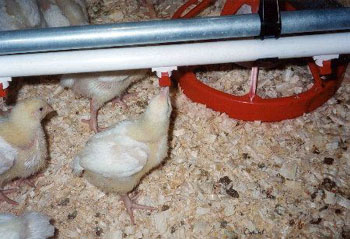Commercial Poultry
Over 1,000 farms in Manitoba have chickens, turkeys, and other poultry. Most flocks are very small with the birds kept for home use. Manitoba is self-sufficient in poultry and egg production and almost all of the eggs and meat consumed by Manitobans are produced on the 400 commercial poultry farms in the province.
On-farm Food Safety
Commercial poultry and egg producers participate in on-farm food safety programs to document that they are taking the steps needed to produce a safe, quality product. They are regularly inspected for record keeping, biosecurity and food handling practices.
One of the important steps when shipping birds to market is proper feed withdrawal. Monitoring and implementing a good feed withdrawal program will produce cleaner end product with a longer shelf life.
Other Links
Small Flock Poultry

Flock
management is an important consideration for keeping poultry flocks of any
size. A good flock management strategy
allows birds to thrive in their environment, meet any production expectations
the owner may have, and produce safe food. The following
information focuses on the feeding, management and health of small
backyard flocks.
Feeds and Nutrition
Supplying the right feed is one of the keys to a healthy, productive small flock of chickens. The nutrients and feed ingredients must be matched to the age and type of bird being raised.
- Basic Feeding Programs for Small Chicken Flocks
- Choice-Feeding of Small Laying Hen Flocks
- Feeding Small Poultry Flocks Organic Diets Without Synthetic Amino Acids
- Increasing Omega-3 Fatty Acids in Eggs From Small Chicken Flocks
- Organic Diets for Small Poultry Flocks
- Poultry Rations and Feeding Methods - June, 1945
- Comments on the 1945 Poultry Rations
Management
The health and well-being of a small poultry flock depends on maintain good air quality, temperature, litter and litter conditions.
- Ammonia and Your Small Flock of Laying Hens
- Brooding Temperatures for Small Poultry Flocks
- Cracked Eggs and Your Small Flock of Laying Hens
- Egg Size and Your Small Flock of Laying Hens
- Foot Pad Health and Your Small Poultry Flock
- Lighting Program for Small Roaster Flocks
- Managing Ammonia Production in Your Turkey Litter
- Pastured Poultry
- Weak Shelled Eggs and Your Small Flock of Laying Hens
Animal Health and Biosecurity
Small flocks are susceptible to a number of diseases. Other poultry flocks, especially other birds from other backyard flocks, are common sources of these diseases. For some diseases like avian influenza, wild waterfowl are a concern. Practicing good biosecurity is an important method of protecting your birds.

